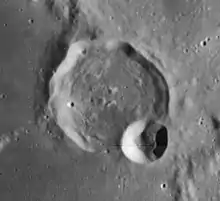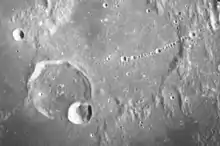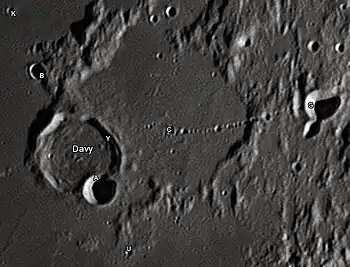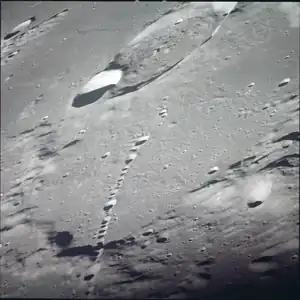Davy (crater)
Davy is a small lunar impact crater that is located on the eastern edge of the Mare Nubium. It was named after British physicist Humphry Davy.[1] It overlies the lava-flooded remains of the satellite crater Davy Y to the east, a formation which contains a crater chain designated Catena Davy. To the southeast of Davy is the prominent crater Alphonsus.
 Lunar Orbiter 4 image | |
| Coordinates | 11.8°S 8.1°W |
|---|---|
| Diameter | 34 km |
| Depth | 1.4 km |
| Colongitude | 8° at sunrise |
| Eponym | Humphry Davy |
The outer rim of Davy is low, and the interior has been partly resurfaced. The perimeter is somewhat polygonal in shape, especially in the western half, and the southeast rim has been overlain by Davy A. The latter is bowl-shaped with a notch in the northern rim. The interior of Davy lacks a central peak, although there are some low central mounds and the rim of Davy Y forms a low ridge leading from the northern outer rim.
Catena Davy

This linear string of 23 tiny craters runs from the midpoint of Davy Y towards the walled basin Ptolemaeus, following a slightly curving course to the east-northeast. It is located at selenographic coordinates 11.0° S, 7.0° W, and has a length of 50 km.
This formation is not believed to be due to secondary cratering because it is not radial to a suitable source crater. The most likely cause is believed to be a single body that broke apart prior to impact due to tidal effects. High resolution images have demonstrated that the craters formed at about the same time since the ejecta from each crater does not overlay neighboring craters. However, there are still some scientists who believe that this chain of craters may be volcanic in origin.
In 1974, six of the craters in the chain were given "unofficial" names for use in connection with NASA's Topophotomap 77D1S1(10). These names, listed below, were later adopted by the IAU. Their positions in the chain are not readily distinguished based on their official coordinates, but they are well identified on the topophotomap.
Catena Davy was considered as a possible early Apollo landing site.[2]
| Crater | Coordinates | Diameter | Name source |
|---|---|---|---|
| Alan | 10.9°S 6.1°W | 2.0 km | Irish masculine name |
| Delia | 10.9°S 6.1°W | 2.0 km | Greek feminine name |
| Harold | 10.9°S 6.0°W | 2.0 km | Scandinavian masculine name |
| Osman | 11.0°S 6.2°W | 2.0 km | Turkish masculine name |
| Priscilla | 10.9°S 6.2°W | 1.8 km | Latin feminine name |
| Susan | 11.0°S 6.3°W | 1.0 km | English feminine name |
Satellite craters

By convention these features are identified on lunar maps by placing the letter on the side of the crater midpoint that is closest to Davy.
| Davy | Latitude | Longitude | Diameter |
|---|---|---|---|
| A | 12.2° S | 7.7° W | 15 km |
| B | 10.8° S | 8.9° W | 7 km |
| C | 11.2° S | 7.0° W | 3 km |
| G | 10.4° S | 5.1° W | 16 km |
| K | 10.2° S | 9.5° W | 3 km |
| U | 12.9° S | 7.1° W | 3 km |
| Y | 11.0° S | 7.1° W | 70 km |
References
- "Davy (crater)". Gazetteer of Planetary Nomenclature. USGS Astrogeology Research Program.
- To A Rocky Moon, 1993, by Don Wilhelms. PDF version available from L&PI. Chapter 13, p. 245.
- Andersson, L. E.; Whitaker, E. A. (1982). NASA Catalogue of Lunar Nomenclature. NASA RP-1097.
- Blue, Jennifer (July 25, 2007). "Gazetteer of Planetary Nomenclature". USGS. Retrieved 2014-10-16.
- Bussey, B.; Spudis, P. (2004). The Clementine Atlas of the Moon. New York: Cambridge University Press. ISBN 978-0-521-81528-4.
- Cocks, Elijah E.; Cocks, Josiah C. (1995). Who's Who on the Moon: A Biographical Dictionary of Lunar Nomenclature. Tudor Publishers. ISBN 978-0-936389-27-1.
- McDowell, Jonathan (July 15, 2007). "Lunar Nomenclature". Jonathan's Space Report. Retrieved 2007-10-24.
- Menzel, D. H.; Minnaert, M.; Levin, B.; Dollfus, A.; Bell, B. (1971). "Report on Lunar Nomenclature by the Working Group of Commission 17 of the IAU". Space Science Reviews. 12 (2): 136–186. Bibcode:1971SSRv...12..136M. doi:10.1007/BF00171763. S2CID 122125855.
- Moore, Patrick (2001). On the Moon. Sterling Publishing Co. ISBN 978-0-304-35469-6.
- Price, Fred W. (1988). The Moon Observer's Handbook. Cambridge University Press. ISBN 978-0-521-33500-3.
- Rükl, Antonín (1990). Atlas of the Moon. Kalmbach Books. ISBN 978-0-913135-17-4.
- Webb, Rev. T. W. (1962). Celestial Objects for Common Telescopes (6th revised ed.). Dover. ISBN 978-0-486-20917-3.
- Whitaker, Ewen A. (1999). Mapping and Naming the Moon. Cambridge University Press. ISBN 978-0-521-62248-6.
- Wlasuk, Peter T. (2000). Observing the Moon. Springer. ISBN 978-1-85233-193-1.
External links
- Topophotomap 77D1S1(10) showing location of minor named features.
- Lunar Orbiter map and photo of Alphonsus, shows relationship of Davy to Alphonsus and Ptolemeus.
- Wood, Chuck (January 27, 2004). "Davy's Chain". Lunar Photo of the Day.
- Wood, Chuck (July 14, 2004). "Jim and Davy". Lunar Photo of the Day.
- Wood, Chuck (April 25, 2005). "A Chain of Mystery". Lunar Photo of the Day.
- Wood, Chuck (July 15, 2006). "Mistaken Identity". Lunar Photo of the Day.
- Wood, Chuck (November 27, 2006). "A Long Line in a Clutter of Magnificence". Lunar Photo of the Day.
- Wood, Chuck (January 31, 2010). "Spotted Moon". Lunar Photo of the Day.

